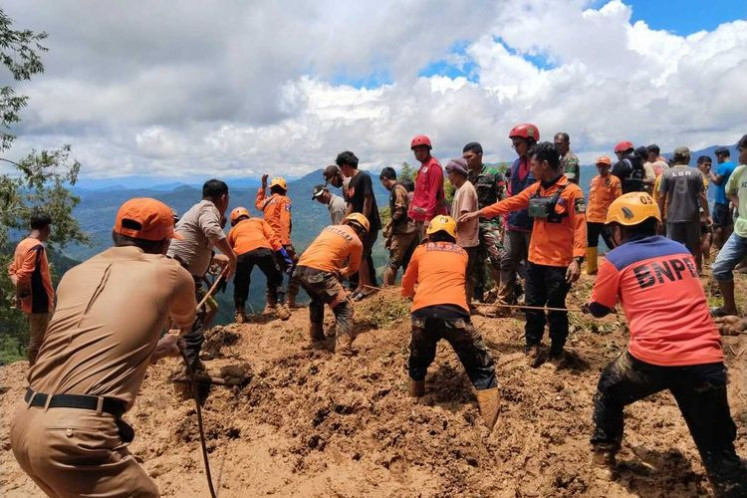Back to nature
Jungle hut: Built of timber, the traditional-like houses on stilts are what the community call home

Jungle hut: Built of timber, the traditional-like houses on stilts are what the community call home.
It’s nice to escape the city once in a while. Like a weekend a month. Just every now and then.
As much as urbanites love to reminisce about the natural way of life of their parents’ parents, not many can actually stand Mother Nature for longer than a weekend getaway.
Well, 59-year-old Eddy Djamaluddin Suaidy and 125 of his friends and relatives choose to do it 24/7. They do more than just grow their own food or mow their own lawns; this community tries to remind us what communal living is all about.

On one afternoon during the fasting month, three women were peeling shallots, slicing red chilies and sorting spinach leaves in one of the houses tucked inside the 5-hectare suburban farm in Depok. In the garden across from them, a man was sweeping up dried leaves.
There are no housemaids or gardeners. Just a clear job description for each individual living there.
“If this weren’t Ramadan, at lunchtime the kids would automatically gather here. So would the adults who work here,” said the man who was sweeping the garden. A former colleague of Eddy, Erwin Yulianto Kosasih just recently joined the community after leaving his home in crowded West Jakarta’s Ciledug.
Done with his broom, Erwin helped the cook take what was left of the spinach stems to feed a baby deer in a cage nearby. In the neighborhood of Kampung 99, nothing goes to waste.
Kitchen waste becomes animal feed. Animal manure and dried leaves become organic fertilizers. Even fallen branches become the source of energy for the kitchen.

It’s basically an ecosystem where man is more a manager than mere exploiter.
“We try to make the most out of what we have here,” said Umi Santi, a niece of Eddy who decided to give up her teaching job at a private university and take her family there to develop organic food processing for the community.
They make their own bread and yogurt, consume fresh goat’s milk and slaughter a cow once a week for their meat. Currently, about 80 percent of their food comes from the farm.
Even the buildings they call home are made of local wood. A handful of houses in the complex are shared between two and four families, making it reminiscent of traditional Indonesian village life.
Up on one of the stilt houses, a mother is feeding her baby while goats are tucked away in their quarters underneath.
But don’t imagine these people are going back to some pre-modern era. Cell phones, TV, computers, Internet connection and refrigerators are still part of their everyday life.
“We are not trying to live like some tribal community. We merely want a different way of living which can help us contribute something to nature,” Eddy explained.
At first, Eddy, who founded the community, sought only to escape the jaded city lifestyle. In 1989, he first bought a 500-meter plot alongside the Pesanggrahan river and built a wooden house on stilts, mimicking the traditional Tomohon house of Kalimantan.
Slowly, his idea of going back to nature became wilder. He bought more land and gradually transformed the previously almost sterile ground, which was also prone to landslides, into what he calls an urban jungle.
He bought cows and goats and planted 10 trees each day; in just three years, he could actually call his home a sanctuary. Eddy then invited first his relatives to join in with making this alternative way of living a reality.

“I want my grandchildren to be nurturers of nature, not exploiters. We have so long been crippled by the mainstream idea of living, having a house in a real estate complex, a motorcycle and a car. When in fact, we are capable of so much more,” Eddy pointed out.
“We too often theorize about the environment, talking about preventing floods and disasters while rarely willing to actually live with nature.”
Eddy’s children, niece, nephews and grandchildren have indeed learned more than just about caring for nature. They learn about living as communal beings in the midst of the increasingly individualized urban lifestyle.
Everything here belongs to and is decided by the community to the extent that residents consult the weekly gathering even if planning to buy a TV set, Umi Santi said. What each person earns monthly is collected and spending priorities are set together.
“Here we are taught to be equal and set aside our own egos,” Erwin added. “It’s not easy, but if one wants to fit in here, that’s the basic rule.”
“The mentality we want to build here is that we don’t emphasize the singer, but we emphasize the song,” Eddy said. “It’s the collective work that counts instead of the individual.”
Sounds like a socialist utopia, but it works.
The children still go to the nearest school and teenagers are receiving an education funded by the
collective. In a way, it’s a separate world that stays in touch with outside reality.
Lately, the community has attracted outsiders charmed by the cool micro climate and the various back-to-nature activities that people can do there. In its recent weekly gathering, the community decided to get more professional about opening up their assets to the public.
“We don’t charge entrance tickets or anything here except for special outbound programs. People who drop by are simply asked to plant a tree in the area,” Santi explained.

That afternoon, two guests were getting their hands dirty planting 10-centimeter tall nyamplung trees (Calophyllum inophyllum) on the edge of a contoured plot that overlooks the river.
Plastic sacks filled with soil were already lined up to prevent the land from sliding and it is hoped roots of the trees will keep it together in the future.
The complex itself is as open as it can be, especially for its neighbors. Some 14 locals are hired to help with everyday maintenance and children are free to roam and play in the dirt with buffalos and other animals in the area.
Eddy’s dream is to see what he has done replicated along the stretch of the Pesanggrahan river with
more people taking initiatives for Mother Nature.
“Imagine if we have that stretch of land, each around 10 hectares from Parung Bingung to Pasar Jumat. We will have the largest botanical garden in the world,” he said.
Eddy and his community members have taken the first baby step. And they are waiting for us to walk with them.
— Photos by Anissa S. Febrina









